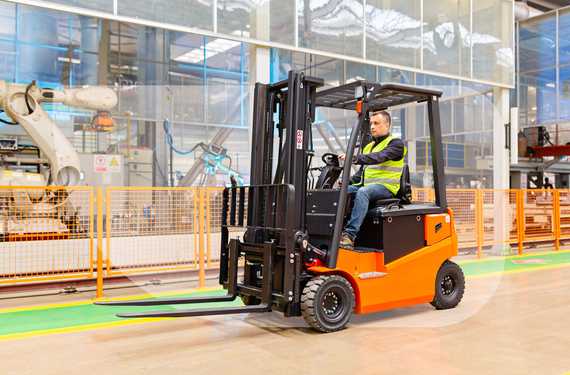

Job Strain for Forklift Operators
02 July 2025 · 3 min reading time
Join Staffmatch
See job offersLifting heavy loads, repeating the same movements, working in cold or dusty environments, performing shifts at odd hours… A forklift operator’s daily work is often physically demanding, even hazardous. But is this level of exertion officially recognized as an occupational hardship? And above all: what rights does it entail?
In 2025, the French Labour Code provides several measures to compensate for jobs deemed arduous. These range from enhanced medical monitoring to the Professional Prevention Account (C2P), as well as workstation adjustments and early retirement rights. You first need to know if you qualify—and how to activate these rights.
In this article, we’ll review how forklift operation can be recognized as an arduous profession, the steps to take, and the concrete benefits you can claim.
Is the forklift operator role officially recognized as arduous?
The forklift operator position is not automatically classified as arduous, but it can be when certain exposure conditions are met. The law identifies specific hardship factors (physical, organizational or environmental) which, if they exceed defined thresholds, grant access to compensation.
In many logistics, industrial or retail settings, forklift operators regularly face risk situations.
📌 Examples of hardship factors for a forklift operator:
- Manual handling of heavy loads Operators often handle boxes, pallets or heavy goods by hand in addition to using forklifts. Repeatedly lifting loads over 15 kg meets the hardship criteria.
- Strenuous postures & repetitive movements Trunk rotations, prolonged bending, constrained movements to reach storage areas, and high-frequency repetitive gestures (over 15 movements/minute) occur frequently during loading/unloading.
- Mechanical vibrations Driving handling equipment exposes operators to seat- and floor-transmitted vibrations. Exposures above 2.5 m/s² are classified as arduous.
- Noise In some warehouses, sound levels exceed 81 dB(A) over 8 hours or reach 135 dB(C) intermittently, requiring hearing protection and potentially triggering a hardship declaration.
- Night work Working at least one hour between midnight and 5 AM for 120 nights per year qualifies as a hardship exposure. Many operators on shift rotations fall under this.
- Shift work Operators rotating schedules weekly (e.g. day/afternoon/night) are affected. If they work at least 50 nights per year in alternating shifts, this can be recognized as a hardship factor.
If these exposures are repeated and exceed the Labour Code thresholds, the employer can declare the position as “exposed to hardship,” opening access to the Professional Prevention Account (C2P).
What rights come with hardship recognition for a forklift operator?
When a forklift operator is exposed to one or more recognized hardship factors, they may claim specific rights under the Labour Code.
Professional Prevention Account (C2P)
The C2P is an individual account that accrues points when hardship factors are declared by the employer via the DSN.
- Who qualifies? All private-sector employees, including temporary and fixed-term contracts, provided they’ve been exposed at least 3 consecutive months in a year to one or more factors.
- Points allocation:
- 1 factor in 1 year = 4 points
- 2 or more factors = up to 8 points/year
- Career cap = 100 points
- Declaration: Made by the employer through the monthly DSN after a workstation assessment (often involving occupational health services).
- Using your points:
Objective Points required Training for a non-exposed profession 25 points Full-pay part-time work 10 points per quarter Early retirement 10 points = 1 quarter 🔎 The first 20 points are automatically reserved for training, unless you were born before 1960.
Enhanced medical monitoring
A forklift operator recognized for hardship is entitled to:
- A mandatory pre-employment medical exam
- Regular follow-up with occupational health
- Workstation adjustments or reassignment if needed
Employer declaration
The employer must:
- Evaluate exposure conditions and declare the relevant factors in the DSN
- Implement prevention measures
- Provide an exposure record to the employee upon request
If the employer omits this, the employee can consult the occupational physician, the Works Council (CSE) or the Labour Inspectorate.
Can a forklift operator retire earlier under these provisions?
Yes. Through C2P points, a forklift operator can advance their retirement date:
- 10 points = 1 quarter of early retirement
- Max: 8 quarters (2 years)
Conditions:
- At least one hardship factor declared for ≥ 3 consecutive months in a year
- Points must be properly credited to the C2P account
- Early departure under the general scheme rules
💬 Note: Some former criteria (e.g. cold exposure or chemical risks) no longer yield C2P points but still justify enhanced medical follow-up.
Forklift operators and working conditions: Labour Code requirements
Risk prevention
Employers must implement prevention measures based on identified risks:
- Personal protective equipment (PPE): gloves, earplugs, safety vests, non-slip footwear
- Safety training: mandatory for forklift operation (CACES) and ergonomic handling
- Workstation design: reduce repetitive tasks, improve ergonomics, minimize manual handling
- Schedule management: adapt shifts to limit excessive night work or rotations
Right to medical surveillance
A forklift operator is entitled to:
- An information/prevention visit at hire
- Periodic medical exams based on exposure
- Enhanced monitoring for high-risk posts (vibrations, manual handling, night shifts)
- Access to occupational physician recommendations for adjustments, reassignment or, if necessary, declaration of unfitness
Right to information
The employee must be:
- Informed of their hardship-related rights
- Trained in preventive practices
- Notified of the C2P account and exposure assessment
- Provided an individual exposure record on request
💬 If the employer refuses to acknowledge hardship, the employee can file an alert with the CSE or the Labour Inspectorate.
✅ Key takeaways if you’re a forklift operator exposed to hardship
- 🔍 Observe your working conditions Heavy loads, shift work, vibrations, noise? If you recognize these, you may be exposed to one or more legal hardship factors.
- 📄 Check your collective agreement It may grant extra premiums, days off or specific benefits. Its name appears on your payslip—ask HR or consult Legifrance if unsure.
- 👥 Lean on internal resources The CSE, HR department or occupational physician can help you have your exposure recognized or arrange workstation adjustments.
- 🧾 Create your C2P account Check your point balance and ensure your employer has declared your exposures: 👉 compteprofessionneldeprevention.fr
Become a temp worker with Staffmatch!

OUR MOBILE APPS Download the temp worker app
Download the temp worker app Download the business app
Download the business app Download our temp worker app
Download our temp worker app Download our business app
Download our business app

